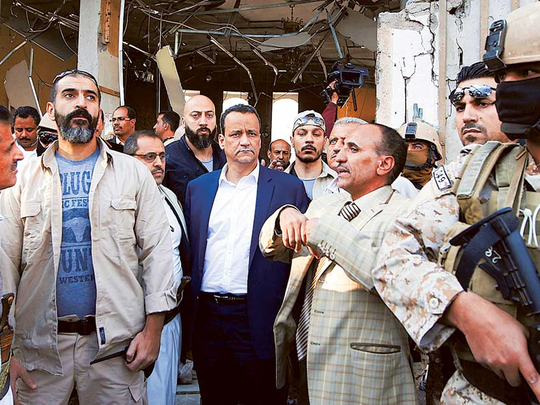
Al Mukalla: Yemen’s government has warned that it would not accept any peace plan that could “give legitimacy” to Al Houthis’ seizure of power in 2014 and would only adhere to commitments made during the previous rounds of peace talks.
Yemen foreign minister Abdul Malik Al Mekhalfi said on his Twitter account that the internationally supported government would reject peace plans that do not include disarmament of the Al Houthi militia and their withdrawal from cities they took control of after their coup two years ago.
“Any attempt to keep the militia and its arms anywhere won’t be accepted by our people who sacrificed thousands of martyrs for peace and freedom,” Al Mekhlafi said on Tuesday.
The foreign minister’s reiteration of his government’s stand comes amid reports that the UN envoy to Yemen, Esmail Ould Shaikh Ahmad, who is currently in Al Houthi-held capital, presented a fresh draft agreement to the rebels to end more than a year of conflict.
Unconfirmed reports say that the new proposal includes forming a unity government coinciding with Al Houthis’ withdrawal from three provinces: Sana’a, Taiz and Hodeida.
Fearing another coup by Al Houthis, the government of president Abd Rabbo Mansour Hadi insists that the rebel movement hand over their arms to a neutral military committee made up of army officers who are not involved in Al Houthis’ military expansion. “Any solution that does not adhere to the three references will only legitimise the coup and won’t achieve peace.” he said, referring to the GCC initiative, National Dialogue Conference and the UN Security Council resolution 2216.
During peace talks in Kuwait that ended in August without yielding an agreement between the warning factions, the Yemeni government agreed to sign a draft agreement stipulating Al Houthis’ withdrawal from three provinces in northern Yemen followed by forming a government where the two sides share power. “We will not backtrack on our pledges during peace talks including the UN-proposed plan in Kuwait.” Abdul Raqeb Fateh, minister of local administration, told Gulf News on Tuesday.
Meanwhile, fighting intensified on Tuesday between the government forces and Al Houthis on all fronts in northern Yemen amid intensive air raids from the Saudi-led warplanes. Local army commanders in the province of Jawf said on Tuesday that fighting raged in the district of Al Masloub as the rebel forces pushing to make territorial gains after losing most of major cities in the province. Fierce clashes were also reported in Shabwa, Taiz and Marib’s Serwah.
In Sana’a, hundreds of people demonstrated on Tuesday against what they described as the United Nations’ “complicity” in the country’s deadly 19-month-old war, witnesses said.
The protesters gathered outside a Sana’a hotel where the UN envoy was staying as he tried to convince the warring parties to accept a ceasefire and resume peace talks.
“Leave, leave Yemen,” the demonstrators chanted, addressing the UN envoy.
“The UN and the Security Council are complicit in the killing of Yemenis,” read one of the banners at the Sana’a demonstration.
The rally, which was held in response to calls by the rebels, ended as the UN envoy was to leave the hotel for Sana’a airport, witnesses said.
A statement published by rebel-controlled media said the protesters “condemn the UN envoy’s intentional obstruction of the talks” and his “silence on the crimes and massacres committed by the Saudi aggressors” against Yemenis.
A 72-hour ceasefire to allow aid deliveries officially ended at midnight on Saturday as the two sides traded accusations of violations.
— With inputs from AFP












